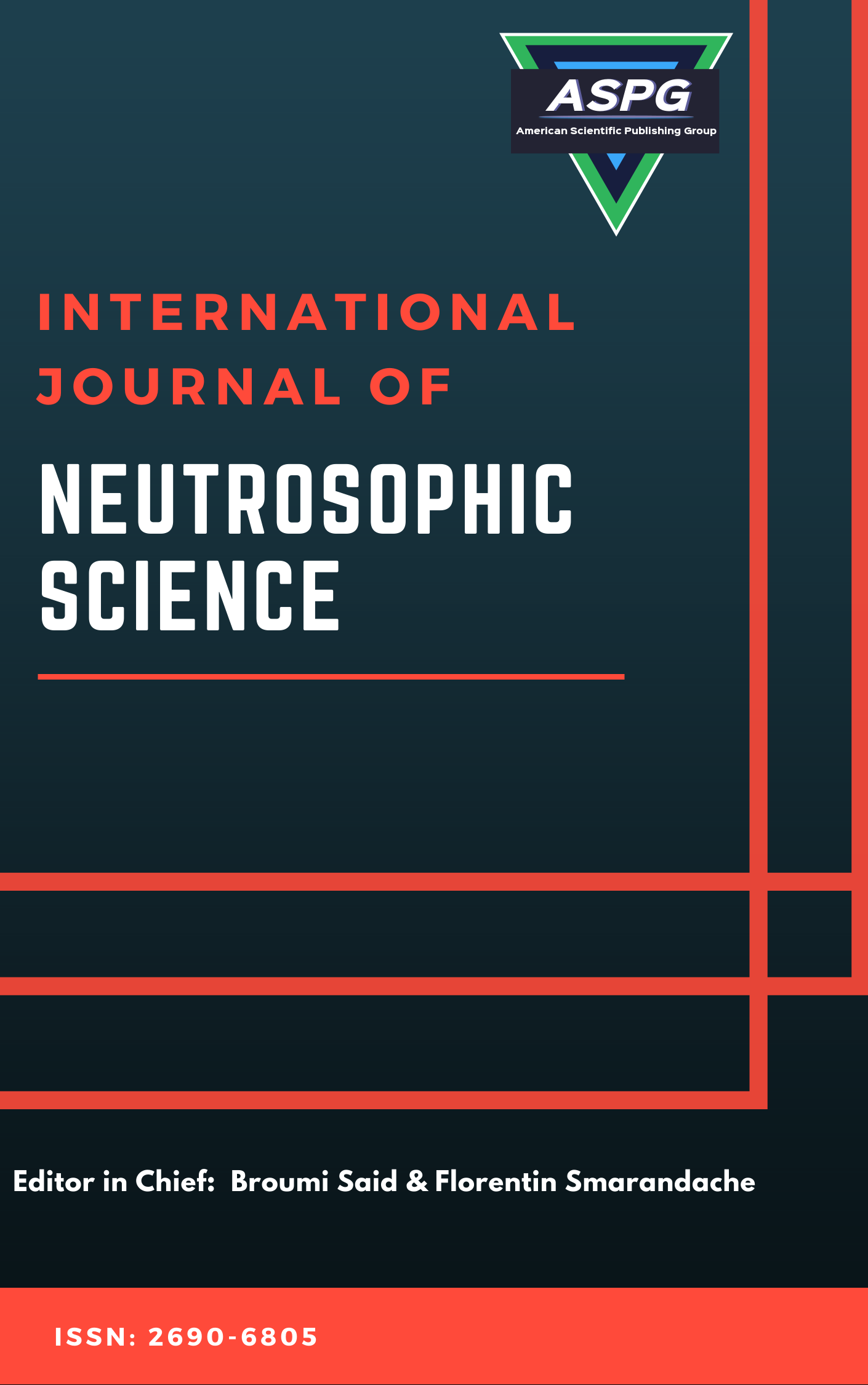

Volume 25 , Issue 2 , PP: 279-289, 2025 | Cite this article as | XML | Html | PDF | Full Length Article
Halla Elziber Elsiddeg Elemam 1 * , Abdelgalal O. I. Abaker 2 , Elavarasi Gunasekaran 3 , Hago E. M. Ali 4 , Abdullah S. Alharbi 5 , Amer Alsulami 6 , Azhari A Elhag 7
Doi: https://doi.org/10.54216/IJNS.250224
Neutrosophic set (NS) is a prevailing logic aimed at facilitating the understanding of inconsistent and indeterminate data; several kinds of complete or incomplete data can be described as interval-valued NS (IVNS). This study presents aggregation operator for IVNSs and prolongs the generalized weighted aggregation (GWA) operations to congruently work with IVNS information. Also, these results are formulated as IVNSs that are represented by indeterminate, truth, and false degrees. The tremendous growth of financial innovation offers a several convenience to people’s lives and production and brings many security risks to financial technology. To avoid financial risk, an improved way is to construct an accurate warning mechanism before the financial risk takes place, not to solve this matter after the risk outbreak. Recently, deep learning (DL) has delivered outstanding results in the natural language processing and image recognition areas. Thus, researcher used DL techniques for the financial risk prediction and obtained satisfactory results. This study develops a new Pythagorean Neutrosophic Normal Interval-Valued Weighted Averaging for Financial Risk Prediction (PNNIVWA-FRP) method using sustainable development. The objective of the PNNIVWA-FRP method is to have two dissimilar stages of processes. Initially, financial data are classified by the PNSNIVWA technique. This method is used for its highest proficiency in managing imprecision and uncertainty in financial data, containing incomplete and ambiguous data. Second, the classified parameter is fine-tuned by means of Glowworm Swarm Optimization (GSO) technique. Based on the luminescent communication of glowworms, GSO is proficient at navigating multidimensional, complex search spaces for identifying better solutions. The empirical findings on benchmark dataset demonstrate the effectiveness of the PNNIVWA-FRP method, showcasing significant development in prediction results than classical approaches.
Financial Risk Prediction , Neutrosophic Set , Interval Valued Neutrosophic Set , Weighted Aggregation , Glowworm Swarm Optimization
[1] Parimala, M., Karthika, M. and Smarandache, F., 2020. A review of fuzzy soft topological spaces, intuitionistic fuzzy soft topological spaces and neutrosophic soft topological spaces. International Journal of Neutrosophic Science, Vol. 10, No. 2, 2020, PP. 96-104.
[2] Ashraf, S. and Abdullah, S., 2020. Decision support modeling for agriculture land selection based on sine trigonometric single valued neutrosophic information. International Journal of Neutrosophic Science (IJNS), 9(2), pp.60-73.
[3] Ashraf, S. and Abdullah, S., 2020. Decision support modeling for agriculture land selection based on sine trigonometric single valued neutrosophic information. International Journal of Neutrosophic Science (IJNS), 9(2), pp.60-73.
[4] Al-Hamido, R.K., Salha, L. and Gharibah, T., 2020. Pre Separation Axioms In Neutrosophic Crisp Topological Spaces. International Journal of Neutrosophic Science, 8(2), pp.72-79.
[5] Salama, A.A., Henawy, M.B. and Alhabib, R., 2020. Online Analytical Processing Operations via Neutrosophic Systems. International Journal of Neutrosophic Science, 8(2), pp.87-109.
[6] Liu, Y., Liu, L. and Ren, G., 2019. Financing Risk Prediction of China's Listed Company based on GA-SVR Model. Journal of Beijing Institute of Technology (Social Sciences Edition), (4), pp.73-81.
[7] Valaskova, K., Kliestik, T., Svabova, L. and Adamko, P., 2018. Financial risk measurement and prediction modelling for sustainable development of business entities using regression analysis. Sustainability, 10(7), p.2144.
[8] Peng, X. and Huang, H., 2020. Fuzzy decision making method based on CoCoSo with critic for financial risk evaluation. Technological and Economic Development of Economy, 26(4), pp.695-724.
[9] Ashraf, S., GS Félix, E. and Serrasqueiro, Z., 2019. Do traditional financial distress prediction models predict the early warning signs of financial distress?, Journal of Risk and Financial Management, 12(2), p.55.
[10] Li, J., Yang, L., Smyth, B. and Dong, R., 2020, October. Maec: A multimodal aligned earnings conference call dataset for financial risk prediction. In Proceedings of the 29th ACM International Conference on Information & Knowledge Management (pp. 3063-3070).
[11] Hou, L., Lu, K. and Bi, G., 2024. Predicting the credit risk of small and medium‐sized enterprises in supply chain finance using machine learning algorithms. Managerial and Decision Economics, 45(4), pp.2393-2414.
[12] Lei, Y., Qiaoming, H. and Tong, Z., 2023. Research on supply chain financial risk prevention based on machine learning. Computational Intelligence and Neuroscience, 2023(1), p.6531154.
[13] Gu, Z., Lv, J., Wu, B., Hu, Z. and Yu, X., 2024. Credit risk assessment of small and micro enterprise based on machine learning. Heliyon, 10(5).
[14] Shen, H., 2023. Assessment of financial risk pre-alarm mechanism based on financial ecosystem using BPNN and genetic algorithm. Soft Computing, 27(24), pp.19265-19279.
[15] Zhang, J., 2024. Impact of an improved random forest-based financial management model on the effectiveness of corporate sustainability decisions. Systems and Soft Computing, 6, p.200102.
[16] Ma, Z., Wang, X. and Hao, Y., 2023. Development and application of a hybrid forecasting framework based on improved extreme learning machine for enterprise financing risk. Expert Systems with Applications, 215, p.119373.
[17] Palanikumar, M., Arulmozhi, K. and Jana, C., 2022. Multiple attribute decision-making approach for Pythagorean neutrosophic normal interval-valued fuzzy aggregation operators. Computational and Applied Mathematics, 41(3), p.90.
[18] Chavan, R. and Pete, D., 2024. Automatic multi-disease classification on retinal images using multilevel glowworm swarm convolutional neural network. Journal of Engineering and Applied Science, 71(1), p.26.
[20] Dong, H., Liu, R. and Tham, A.W., 2024. Accuracy Comparison between Five Machine Learning Algorithms for Financial Risk Evaluation. Journal of Risk and Financial Management, 17(2), p.50.